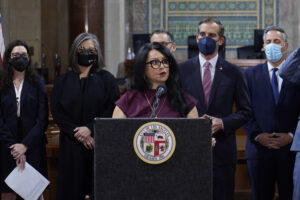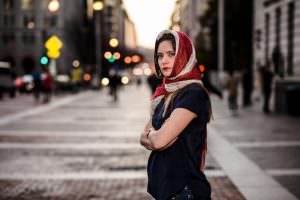Photo of the Week: A Burkini in Marseille
French descendants of those who once displayed the words "Liberty, Equality, Fraternity" in the streets are driving modestly garbed Muslim women from their innocent leisure. French descendants of those who once displayed the words "Liberty, Equality, Fraternity" in the streets are driving modestly garbed Muslim women from their innocent leisure.Nissrine Samali steps into the Mediterranean wearing a burkini, a wetsuit-like version of the burqa worn by some Muslim women, in Marseille, France. (AP)
Every week, Truthdig’s editors present an image that singularly renders the world’s triumph, trouble or toil.
A woman steps into the sea. Water displaced by her feet flies lightly into the air. Nearby, children wade and play. No one appears uncomfortable, yet the image is a trigger in France, where descendants of people who once displayed the words “Liberté, égalité, fraternité” in their public squares wish to exclude from those ideals certain peaceful others, many of whom were forced from their homelands by oppressors and events beyond their control.
Bans on “burkinis” this month in more than a dozen French cities and towns — a move supported by many high-profile public figures — reminds us that the capacity for cultural intolerance or its more aggressive elder sibling, cultural bigotry, is a nagging constant in human affairs.
The French have their reasons: A long string of grisly attacks in recent months and years, committed by people thought to be of a certain foreign origin, has sent many French residents searching beyond the realms of brotherly love for assurances of physical safety.
And on their servants go, in boots and dark uniforms, to fine, harass and drive women from their leisure for wearing clothing associated with conservative Islamic culture. In mid-August, a woman was photographed removing a long-sleeved tunic on a beach in Nice as four police officers stood around her. One appeared to be writing something, reportedly a fine. Afterward, witnesses said, the woman left.
In Cannes, a 34-year-old mother of two told reporters she had been stopped and fined for wearing a headscarf and other non-revealing clothing on the beach. Officers told her a decree issued by the mayor stipulated that everyone at the beach must wear “correct” clothing and that she should wear the scarf as a bandana or leave.
“I was sitting on a beach with my family. I was wearing a classic headscarf. I had no intention of swimming,” said the woman, who identified herself as a former flight attendant. “I wasn’t in a burkini, I wasn’t in a burqa, I wasn’t naked, so I considered my clothing was appropriate.”
Witnessing the incident, about 10 people rushed over to her in support, telling the officers she wasn’t bothering anyone. But another 10 or so insulted her, saying such things as “Go home,” “We don’t want that here” and “France is a Catholic country.”
“My daughter was crying; she didn’t understand why her mother was being asked to leave,” the woman said. The ticket issued to her read that her clothing did not conform with “good manners” or French secularism.
Ange-Pierre Vivoni, the Socialist Party mayor of Villeneuve-Loubet, just west of Nice, banned the garments in order to “protect the population.” A tribunal in Nice ruled the decision “necessary, appropriate and proportionate” to prevent public disorder, saying the burkini was likely “to offend the religious convictions or (religious) non-convictions of other users of the beach” and to be felt as a “provocation” of the community.
The possible consequences of provoking France’s aggrieved and significantly impoverished Muslim population appeared not to concern the officials.
“Burkini is sad symbol of Islam today going backwards on gender issues,” wrote British activist Maajid Nawaz on Twitter. “Banning it is sad symbol of liberalism today going backwards in reply.”
—Posted by Alexander Reed Kelly.
Your support matters…Independent journalism is under threat and overshadowed by heavily funded mainstream media.
You can help level the playing field. Become a member.
Your tax-deductible contribution keeps us digging beneath the headlines to give you thought-provoking, investigative reporting and analysis that unearths what's really happening- without compromise.
Give today to support our courageous, independent journalists.





You need to be a supporter to comment.
There are currently no responses to this article.
Be the first to respond.